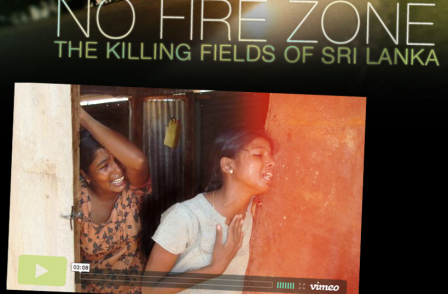
When you announce that you are going to apply for media accreditation for a routine international political event like the bi-annual Commonwealth Heads of Government Meeting (CHOGM) you don’t normally expect a rash of death threats – or to find a senior diplomat from the host country threatening on twitter that he will “make sure you don’t get a visa”.
But this year’s CHOGM is no ordinary event. It is being held in Sri Lanka – whose government is accused of some of the worst war crimes of this century. A country marked today by increasing repression of its Tamil minority and a brutal clamp-down on any government critics, particularly among the press and the judiciary.
When David Cameron controversially announced that he would be attending CHOGM despite calls for a boycott, Alistair Burt, the foreign minister with responsibility for Sri Lanka, went on record to say: “We will make it clear to the Sri Lanka Government that we expect them to guarantee full and unrestricted access for international press covering CHOGM”
The omens for that “guarantee” do not look good.
I have now directed three films looking at the events of the last few months of the civil war. The first two were commissioned and broadcast by Channel 4, building on the work of Channel 4 News. The latest, effectively the culmination of three years of investigation, is No Fire Zone: the Killing Fields of Sri Lanka, a 93 minute feature documentary, supported by C4, BRITDOC and others. The films have had a huge impact, winning a number of awards, being cited by the UN and even seeing the team nominated for the Nobel Peace Prize.
In No Fire Zone we use some of the most disturbing video evidence ever recorded, to chronicle how, just four years ago, the Sri Lankan government announced a series of grotesquely misnamed No Fire Zones, encouraged hundreds of thousands of Tamil civilians to gather there for safety – and then systematically shelled them, also denying them adequate food and medicines. Perhaps 40,000, perhaps – as one UN report suggested – 70,000 or even more civilians died, most killed by government shelling. The predicament of the civilians was made worse by the Tamil Tigers who also stand accused of committing war crimes and of preventing civilians from escaping the No Fire Zones.
It is fair to say the government of Sri Lanka does not like me – or others who have reported the truth from Sri Lanka, including C4 News foreign correspondent Jonathan Miller or former BBC Sri Lanka correspondent Frances Harrison, author of a book of Tamil survivors stories.
But when I revealed that I intended to apply for accreditation to CHOGM (as I did when it was last held in Australia in 2011), it provoked an astonishing series of attacks. Comments published online included a series of clear death threats. One of the mildest, in response to my remark: “I trust the Sri Lankan Government will welcome me” read: “Absolutely white van is waiting at the airport.” White vans are notoriously used in the abduction of government critics and are seen as a weapon of terror associated with extra-judicial killings and disappearances.
Another comment said I was welcome in Sri Lanka “only to go back in a coffin”. And another said: “Callum Macrae – do not come to Sri Lanka. You will be abducted in a white van, and sent to meet Lasantha Wikremasinghe (sic).” Lasantha Wickrematunge was the editor and founder of the Sunday Leader – a respected newspaper critical of the Rajapaksa regime. He was shot and killed by unknown assassins in January 2009.
Then – a week ago, as I was touring with the film in Australia – Ambassador Bandula Jayasekara, a senior Sri Lankan diplomat in Sydney and former Chief media advisor to Sri Lankan President Mahinda Rajapaksa, issued a series of threatening tweets in which he said he would “make sure you don’t get a visa” and accused me of being “hired by (Tiger) terrorists as a full time propagandist for the blood thirsty terror group overseas”.

Indeed, far from condemning the death threats against me, he seems almost to be encouraging the climate of hostility and suspicion which lies behind them. Then last week the Sri Lankan government’s own media minister echoed his words saying: “press freedom… cannot be something that can be framed inside aiding terrorism or being a propagandist for terrorism. So, we will be 100 per cent cautious about who comes to Sri Lanka for CHOGM.”
As I write this the Sri Lankan government has issued a rather more conciliatory statement, suggesting that they will issue visas to those given accreditation by the Commonwealth Secretariat.
We shall see – and the world’s press will now, I hope, be watching very carefully.
Twitter: @nofirezonemovie
Email pged@pressgazette.co.uk to point out mistakes, provide story tips or send in a letter for publication on our "Letters Page" blog

